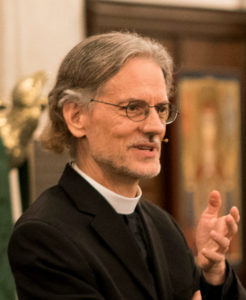The Shining
As Moses spoke face to face with God his own face was being transformed into a glowing brightness that would be too much for the Israelites to look upon; for their sake, he covered his face when he went out to speak to them. Moses’ transfiguration is a type or anticipation of Jesus’ own transfiguration, which many Christians in the West will celebrate on August 6. In Jesus’ case, this transformation would occur on a high mountain with three chosen disciples witnessing his altered countenance and the dazzling whiteness of his raiment.
The question is: What does this radiance signify? The first answer, surely, is that it points to divinity. Unlike with anyone else since Abraham, God spoke to Moses “face to face as one speaks to a friend” (Exodus 33:11). “God is light,” St. John will write, “and in him is no darkness at all” (1 John 1:5). So the light of God, which just is God, rubs off on Moses. It’s like a sunburn (except there’s no burn), or some sort of radioactive experience (except there’s no harm in it). It’s a lingering sign of an encounter with the One who is Light Himself.
Similarly, Jesus’ transfiguration signifies his own divinity. On the mountain, three chosen disciples get to see him revealed as the Son of God, with his Father’s voice speaking, and with Jesus himself speaking with Moses and Elijah, all of them talking about his coming “exodus” (that is, crucifixion and resurrection and ascension). In the Nicene Creed it is said of Jesus that he is “God of God, Light of Light”: this claim is manifested in the event of his transfiguration.
And yet, I think there is more to say. I think it is not enough simply to regard the shining of Moses’ and Jesus’ faces as signs of divinity, either reflected (as in Moses’ case) or intrinsic (as in Jesus’). This is because it is inaccurate to contrast the divine and the human as if they were somehow opposite things. “Divinity” is not a nature; it does not name a thing. Jesus, yes, is both human and divine, but that is not the same as being, for example, both a human and a bear. To be at once human and bear would be to be two things, and you cannot fully be two things—at most you might be part-human and part-bear, but never completely both. But Jesus is fully human and fully divine, and this is okay because these are not opposite things.
It seems to me, therefore, that the shining of Moses’ and Jesus’ faces could just as well signify their real humanity. Consider how you, dear reader, came to be human. There are many partial reasons—your genetics, having human parents, a family tree, and so forth. But ultimately you have come to be a human being because God has spoken you into existence. Every human being is a new creation of God, and God’s instrument of creation is his Word. To picture God speaking to Moses face to face as to a friend is to picture, very intimately, God holding Moses in being, as in fact he holds every one of us in being all the time. To be held in being by God is to be what we really are, which is not God but truly human. Moses shows us that true humanity is a glorious thing. It shines.
Similarly, although even more so, Jesus shows us what it is to be truly human. He was and is in fact more human than any of the rest of us. Jesus is completely human, without any subtraction caused by sin—he shines gloriously. What his disciples got to see on the mountain, then, was a full revelation of Jesus’ humanity.
No matter how discouraged we become, or how burdened by sin, we are human beings, and therefore human glory resides in us. Sometimes, even people like you and me shine. Sometimes we see this shining brilliance in others. It can happen in the least expected places: in a hospital ward with blinking monitors, on a raft floating through hurricane debris, or holding a child born with nine fingers—the light that is truly human can shine brighter than the whitest laundered clothes.
A man is walking through the weeds under the interstate. A van stops. The window rolls down, a bag is held out, a voice asks, “Would you like some food?” The light shines, and it is, at once and always, a light both human and divine.










